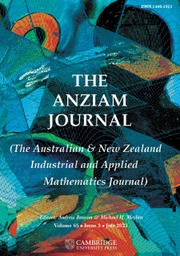Crossref Citations
This article has been cited by the following publications. This list is generated based on data provided by Crossref.
Jianyong, Liu
2002.
Notes on average Markov decision processes with a minimum-variance criterion.
Operations Research Letters,
Vol. 30,
Issue. 2,
p.
107.
Huang, Yong-hui
and
Xian-ping, Guo
2011.
First passage models for denumerable semi-Markov decision processes with nonnegative discounted costs.
Acta Mathematicae Applicatae Sinica, English Series,
Vol. 27,
Issue. 2,
p.
177.


